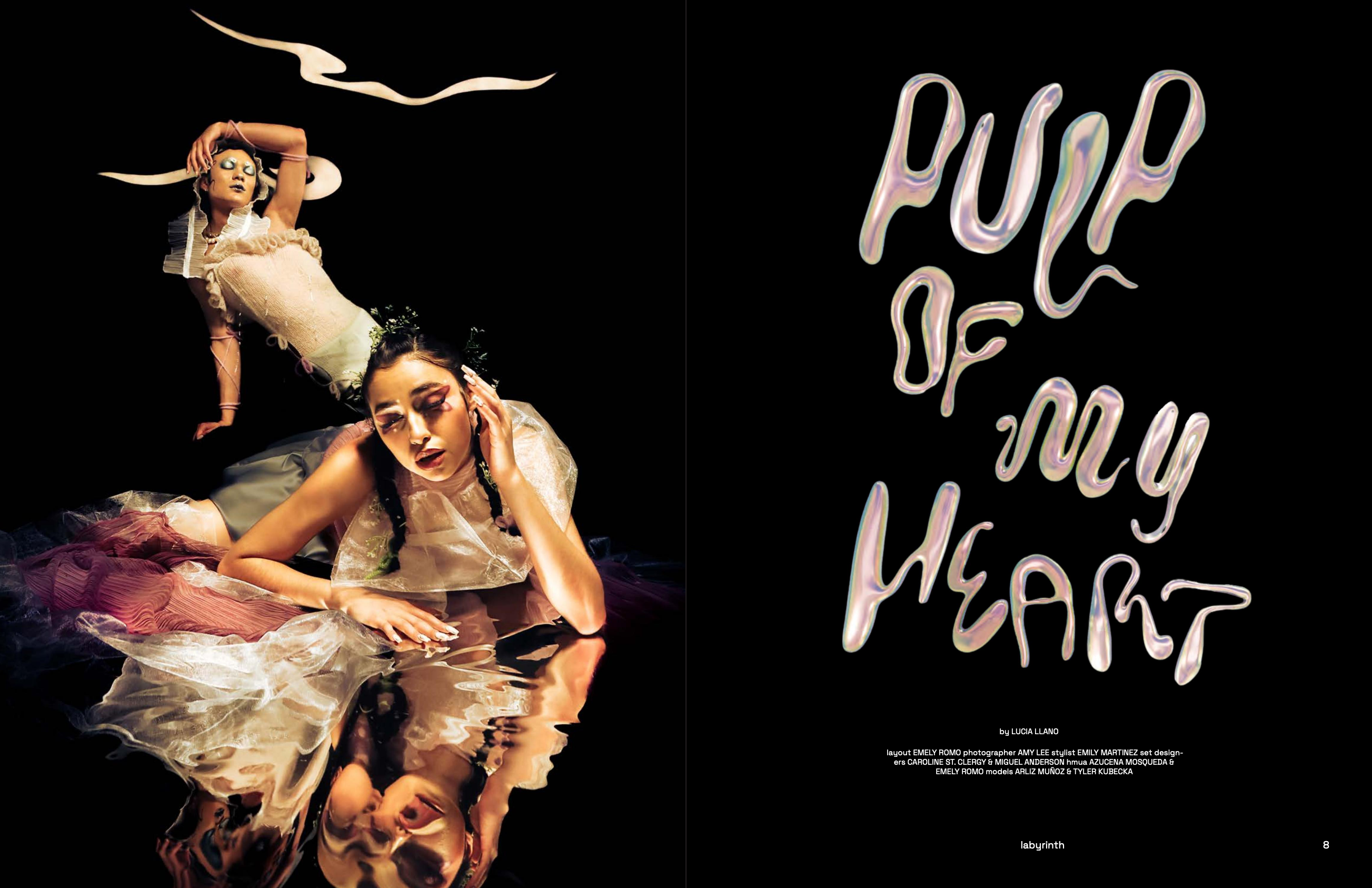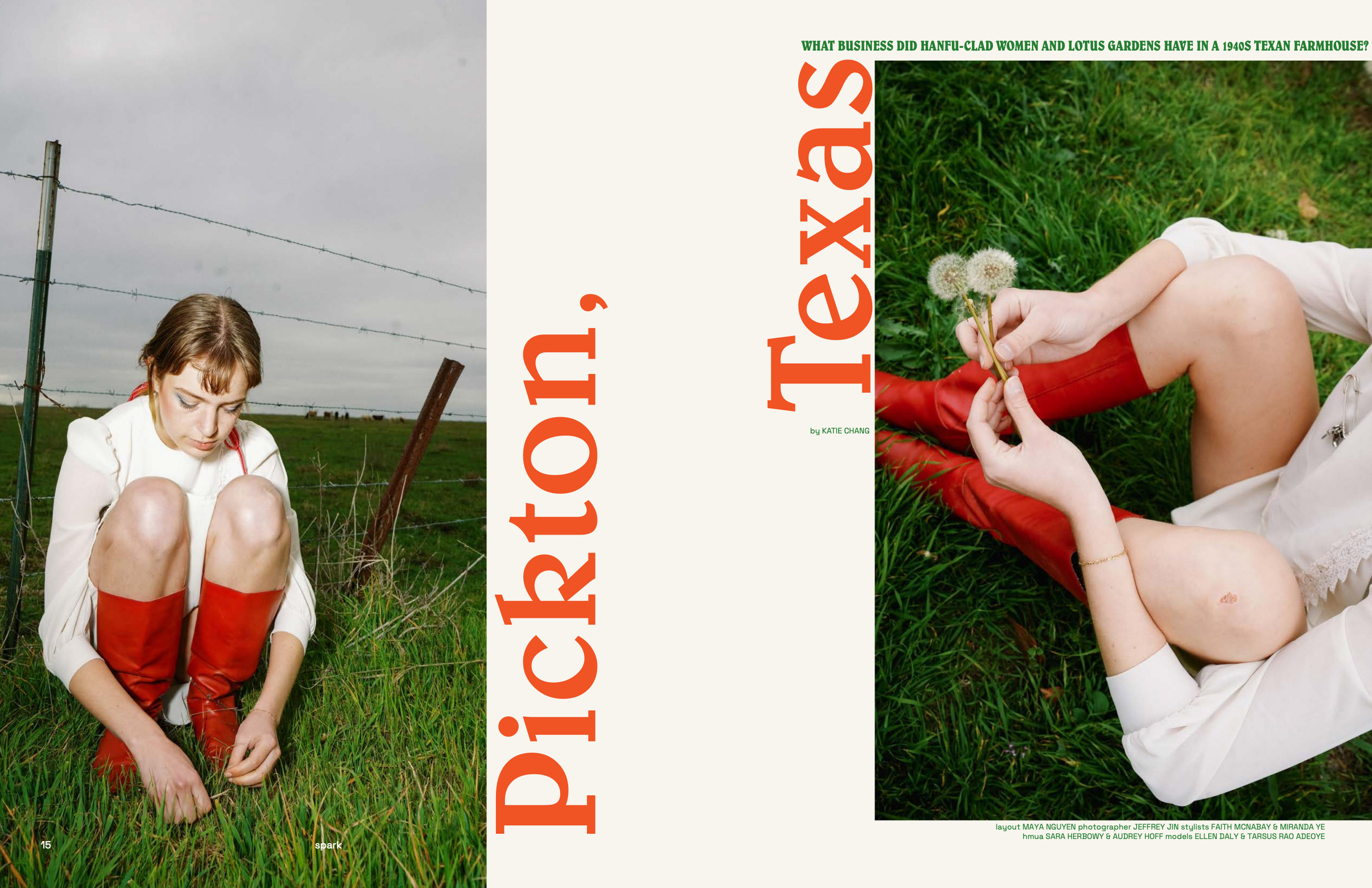Pulp of My Heart
By Lucia Llano
May 2, 2023

The world doesn’t know you as anything but just another beautiful thing of bloom & rot.
i'm spoiled rotten. my skin so soft. so pretty,
go through me
like a worm. it’s so easy
in the rot of your perfect hands.
you left me here, blind, hands outstretched,
murmuring like a fool, calling:
darling, darling—you have my whole heart!
you have it all darling!
my whole, rotten, pink, heart.

white knuckles,
or baby’s breath,
i overwater,
i think, i find myself
with fingers in your mouth
pulling daisies
one by one
from your throat.
and you, like
oak & ivy
you sprout to the touch of me
though
the imprint of my fingers makes
your skin come apart
but you look so beautiful.
i want to pick you
even then.
just to feel you, close and little,
between my two fingers.
even though i make you split in two.
i will love you.
you’re beautiful. you’re honeydew
eyes, clementine cheeks, pomegranate lips
apple of my eye, your ribs
will diverge. your heart, then,
open and gaping for me.
you overwater,
say,
here is all of me; here is my peach pit
here is the pulp of my heart, it is yours,
now,
–take it. ■


Layout: Emely Romo
Photographer: Amy Lee
Stylist: Emily Martinez
Set Stylist: Caroline St. Clergy & Miguel Anderson
HMUA: Azucena Mosqueda & Emely Romo
Models: Arliz Muñoz & Tyler Kubeka
Other Stories in Labyrinth
Pickton, TX
By Katie Chang
May 2, 2023

What business did hanfu-clad women and lotus gardens have in a 1940s Texan farmhouse?
Pickton, Texas, 2014.
The moment I stepped into the house, I wanted to leave. It was as if I’d entered a time capsule, but not the cool type: dingy overhead lighting made the popcorn ceiling super obvious, while wood paneling and red floral wallpaper made the place feel like a haunted dollhouse. It didn’t help that the wallpaper was Asian-themed — I thought the coincidence was a little weird.
Mom told us it was beautiful, but she said a lot of things that didn’t make sense.
We fought constantly — Mom had been away for most of the school year, and at 10, I found her intentions rather confusing. She claimed to want the best for everyone, but I’d watched Dad all year, sallow-faced and sad while he drove me around to all the places she’d always taken me to. If she loved us as she said, why would she leave us for a dusty farmhouse in the middle of nowhere?
It turns out that a decade of suburban housewifery had taken a toll on her, a naturally enterprising woman, and the real tragedy was neither her discarded career or failing marriage. It was her children. No matter how hard she tried to pass down the values instilled in her, her children were growing up to be American kids: kids who expect their lunch to be packed and rides to be covered, who only visit their grandparents during the holidays, who don’t learn what gratitude is until it’s too late.

So, she wanted to change things. I can’t quite recall what she told me, but I remember sitting on the couch the way she hated — on top of the back pillows — when she turned around in her desk chair.
“You know, Mommy grew up on a farm—”
“I know,” I interrupted. I knew where this was going; I had eavesdropped on her and Dad. “I'm not moving schools.”
“Don’t worry about that,” she said, changing the subject. “I found this place that’s not too far. It’s 120 acres and there’s a historic farmhouse right next to a church and…,” she trailed off.
“You know, lots of kids raise cows there. They even have a competition. You can win money if—”
“I’m not moving schools,” I interrupted again. “Also, raising a cow is weird.”
As it turns out, raising a cow is weird. It’s also difficult. But that was the point. The point of the farm was to teach us the things Mom learned in her childhood — the things we couldn’t learn from packed lunches and chauffeured rides. She wanted us to know the sulfurous stench of cow shit and the soreness from sowing fields and the stinging of the sun, because there is something beautiful about putting yourself into the fields and putting the fields into your animals and watching your animals bear offspring. There is something beautiful in watching your animals die, too, and returning them to the ground that had long fed them. To be a farmer is to bear witness to the rawest of life—to wake up each morning at the break of dawn and break your back feeding and feeding, but to sit down as the sun dips below the horizon knowing you’ll be fed back.
Or at least that is what Mom told me—I never did raise a cow.
***
Throughout the school year, Mom spent weeks restoring the farmhouse and sowing the ground for the growing season. Every so often, we’d meet her halfway at Cracker Barrel, where she’d tell us how cute the new piglets were and how many veggies she could grow once the USDA approved her grant request. As we’d part ways in the parking lot, she’d always say she wished to come back soon, but there was just so much work to do.
Only later would I realize that the work was much harder than she let on.
The house had been abandoned for a decade, and the family member who’d been helping grew disenchanted, leaving Mom to manage everything alone. Money was tight. Mom tried to come back home as often as possible, but it wasn’t easy — poor people in Pickton were never kind to a house left by city folks.
By the time the grass had grown tall and the piglets fat, I had graduated 5th grade.
***
One afternoon under the limelight of the late summer sun, I strode through the fields behind the house. The wind tangled my hair and tickled my nose with the smell of wild grass, and every step I took set a hundred grasshoppers aside; their wings fluttered in applause, their shrieks rang out in triumph. This was my royal procession, and in my hot pink Nike shorts and Dollar Tree rain boots, I was every bit a queen.
The next day, I was a country singer. Lounging around the chicken coop, I belted out Taylor Swift’s “Never Grow Up” while our dogs barked and my brother searched for eggs. The day after that, I was a bird, chasing my brother (who was a worm) around the church parking lot.
Outside of the house, I was free to be who and what I wanted to be, free from the sound of my parents bickering about finances and parenting philosophy. Outside, I could find plenty of ways to entertain myself.

Besides, no one could babysit but Mom, and she was constantly working.
Only once in a while would Dad come to visit, and those were the days Mom could hand him the handyman work and take us to pick veggies. It wasn’t easy work — my jet-black hair would burn under the sun and my hands would ache from scissors holes and bucket handles — but I recall one evening we all sat down for dinner made from our harvest.
“Mmm, do you taste how fresh the kale is?” Mom asked.
“I hate kale,” I said, my mouth filled with whatever at the table had carbs. In reality, I didn’t mind kale, but I couldn’t tell her that.
“Katherine. It’s good for your brain. Plus, this is the kale we picked.”
My brother perked up. “I like the kale!”
Mom smiled. “That’s mama’s boy. Katherine, even your brother is eating the kale.”
“I’ll eat the tomatoes.” I said.
A few minutes later, Dad spoke. He didn’t speak much at dinner.
“Looks like the AC is working well.”
“Yep,” Mom said. “You did a good job with it.”
Dad didn’t reply.
“Did the insurance company get back to you?”
Dad sighed. “No. I told you, the house is old—”
“I know. But someone will cover it.”
***
By mid-July the USDA was due to notify Mom about her grant application, but it seemed things were starting to work out on their own. Mom’s veggie garden was so abundant with produce we had to learn how to preserve it all — Mom canned tomatoes, my brother and I made kale chips, and in preparation for the upcoming farmer’s market, Mom bought a blank business name sign for us to decorate with veggie-people and cartoon cows.
At the end of the month, Mom received two manilla envelopes. One of them was the approval for the grant. The other was my Dad’s request for a divorce.
All Dad ever wanted was a wife, kids, and a steady job, and the moment Mom stepped onto the farm, bright-eyed and bold as the cattlemen before her, he knew his dream had come to an end. Every time he’d visit, he’d tell Mom how wonderful her progress was — the hardwood flooring looked great, the greenhouse was impressive — but the more Mom put herself into the farm, the less she left for him. He was losing her.
He didn’t want to lose us too.
Of course, Mom didn’t tell me anything. Dad didn’t either—he wasn’t there. He’d left a few days prior. Soon enough, his gray Honda Fit was in the church parking lot to retrieve me, and then I was home.
We never finished the sign for the farmer’s market.
***
Pickton, Texas, 2018.
Somewhere around Sulphur Springs on a drive back from the East, Dad turned to me from the driver’s seat.
“We’re pretty close to the farm,” he said. “Do you want to stop by?”
The farm. I, like all of us, avoided any mention of the place. Why would Dad want to visit it now?
“Sure,” I said.

As the sunset cast the world in soft red, we pulled into the church parking lot and headed towards the front door. Dad knocked. The new owners showered us in southern hospitality.
When I walked in, I expected to see the house I remembered. Mom said the new owners wanted everything as it was—my childhood desk in the bedroom with the patchwork wallpaper, the heater Mom stuck into the fireplace during the winter, even the collection of outdoor decor in the corner of the living room.
But I walked into an American home, Civil War paintings and all. The couches were covered in cowboy-style pillows, the walls in photos of family members and show horses. The only thing I recognized was the wallpaper, that garish wallpaper — fruit motifs for the dining room, florals for the bedrooms, red Chinoiserie for the living room.
I always thought the Chinoiserie was odd, even when I was 10. Really, what business did hanfu-clad women and lotus gardens have in a 1940s Texan farmhouse?
As it turns out, not much. ■
Layout: Maya Nguyen
Photographer: Jeffrey Jin
Stylists: Faith McNabay & Miranda Ye
HMUA: Sara Herbowy & Audrey Hoff
Models: Ellen Daly & Tarsus Rao Adeoye
Other Stories in Labyrinth
Once Dreamed of Snow
May 2, 2023




Layout: Caro Arredondo
Photographer: Rachel Karls
Stylists: Miguel Anderson & Jonathan Xu
HMUA: Averie Wang & Meryl Jiang
Models: Jillian Le & Noura Abdi
Other Stories in Labyrinth
Nostalgic Paradise
By Emilie Opoku
May 2, 2023

You can take the woman out of Ghana but you can’t take Ghana out of the woman. With God’s will, she’ll find a way to remain her authentic self.
Fresh meat pies sit on the counter, African face masks hang against the walls, lavish beaded jewelry put on display, and the sound of Ghanaian music echoes across the room. The Afribbean market is my mother’s favorite shop for one reason alone: it’s where her dreams begin. I follow her around the store as she starts throwing typical items into the cart – cocoyams, plantain, fufu mix, goat meat, and kobe fish.
At least twice a month, my mother and I go on scavenger hunts. We’ve done this for as long as I’ve been able to walk, and this time is no different than the last.
My mother is notorious for taking hours upon hours to complete simple errands. Time is simply an obscure construct to her – if you’re willing to step out with my mother, you might as well clear your schedule for the entire day. There’s no way to quantify how long the excursion is going to take. She takes as much time as she pleases, collecting everything she needs to return her home. I often find myself riddled with impatience for my mother’s ridiculous shopping habits. But if you ask her, it’s an exhilarating adventure.
While we’re at the market, Serwah’s mind leaves the present and sneaks into a realm of familiarity, into a nostalgic paradise. I’m holding the basket for my mother as she gallivants about the room. She pauses our shopping to make conversation with an old friend from our small community. I shake my head in annoyance. We’ll definitely be here for a minute. They start speaking in Twi, catching up on the usual.
“What are you doing here?”
“How are your kids?”
“When are you going back to Ghana?”
This woman is chatting as if we don’t have a mile long list of groceries.
Joyce Serwah Opoku is the epitome of a Ghanaian woman. My mother grew up along the streets of Ejisu. While she never had much to begin with, her mind has always been one of the most valuable assets known to man. This woman will change for no one. I’ve never seen my mother do an American thing in my life. Eating every meal with her hands is the only way of life my mother knows. She walks to the beat of her own drum. When it comes down to what matters the most in this lifetime, Serwah Opoku has always known that she can only rely on her intuitions to carry through.
A wave of relief washes over me when I hear the conversation end.
“Bye bye yooo.” Like, we came here for a purpose. Girl, stay focused.
We walk over to the produce stand. Serwah notices how the price per pound of yams went up. She calls for Mr. Jacob, the owner and a dear family friend. They start bargaining back and forth in Twi. As they speak, I try to keep up but I’m not quick at translating. My mother gets her way eventually. I take that as a cue to make my way over to the register, because we do have other places to be. Serwah snaps out of her blissful state, and finally realizes it’s time to move elsewhere.
Next, we head down to the 99 Ranch Market. The smell of fresh seafood swarms around us as I witness my mother dipping back into a state of nostalgia. Here we go again.
Serwah strolls over to the counter. She picks out a couple tilapia and asks for the fish to be cleaned properly. We continue to shop around until the fish is ready for pick-up.
My mother loves frying fish. It’s one of her specialties. I remember afternoons of sizzling oil hitting the pan. She raves about how she used to sit outside back home, just frying fish. There were always polarizing forces trying to block Serwah’s inner peace. The stress of living paycheck to paycheck and taking a second job to make ends meet had nearly sucked the life out of her. Frying fish offered a moment of tranquility amongst all that noise.
Surrounded by a world of intangible realities, my mother wasn’t about to let the typical American diet be imposed upon her. It was already hard enough that she wasn’t able to attain higher education, so she had to settle for working in retail. Once she became a mother, all her other aspirations fell astray. It was more important to Serwah that her children make something of themselves. She refused to compromise whatever parts of herself she had left for a burger, french fries, hot dogs – any processed food, for that matter. So long as she had God on her side, Serwah could create her own Ghana in America.
This is my mother’s sole mission. By sticking to her traditional patterns she is able to transverse from the intangible into a realm of familiarity — a place providing her safety despite appearing foreign to the white American eye, whose gaze looks at her and tells her to abandon Ghana, to abandon her home, to abandon herself.
Even though I find the smell of seafood nauseating, I don’t mind the place because it gives my mother a dose of serotonin. As they bring out the fish, she smiles wide with her gap teeth. We pay and depart for the India Bazaar—truly a cross-cultural adventure for us today. This place holds a rich essence, similar to that of the Afribbean Market; both of them lack any aspect of whiteness. We listen to Bollywood music play over the speakers while looking for the tea my mother cannot live without.
Every night before my mother left for work, she had me prepare piping hot tea. It was a soothing force, as she would come back in the morning to get ready for her second job. All I wanted to do was make sure Serwah was taken care of, because she’s constantly taking care of everyone else. So long as she carried that tea with her, she would keep pushing through our everyday struggle. It wasn’t anything fancy but two tea bags, mixed with evaporated milk and a splash of honey. She’s been able to conquer homesickness, depression, and worst of all, grief after the passing of her mother & father. My mother is like Superwoman to me, but even superheroes get exhausted sometimes. The heat of the tea forged a strong fire within Serwah’s heart, and I am in awe of how determined she is to keep that fire lit.
Then we step right into Fiesta. Serwah meticulously picks out dozens upon dozens of habanero peppers. A random woman watches as my mother grabs handfuls of peppers.
“What are you planning to do with all of that?” The woman asks.
My mother blankly replies, “Oh, nothing.”
I give a slight chuckle. A woman of my mother’s magnitude prides herself on never revealing secrets. These precious, powerful peppers are sacred to her for their richness in color, flavor, and quality of life.
When I had COVID-19 last year, Serwah had crafted the perfect pepper soup to help me get better. I was taking my medications, of course, but nothing hit the spot like my mother’s home remedy. That soup opened up my airways and cleansed my aura. She finishes bagging up her peppers and heads over to the produce aisle for banana leaves.
“Why are we getting these again?” I ask.
She replies, “Heh, I need it for my banku.”
Personally, I’m not a fan of it, but banku is a traditional dish made of cassava flour. I used to watch Serwah spend hours in the kitchen making it. She used her hands — calloused from working day in and day out — to knead the dough. Then she would divide the dough into smaller sections, and use those dark green banana leaves to wrap it up.
In the end, venturing across town for an entire day is somewhat worth the chase, though I wish she could put a little bit more pep in her step. We visit a couple more places before we finally make it home. The backs of my feet are aching immensely. I’m worn out. I look over to my mother and roll my eyes as she grins from ear to ear. The scavenger hunt fuels my mother’s desire to continue living in a country that felt foreign to her. It gives her the powerful feeling of familiarity, harnessing and protecting her cultural identity as a Ghanaian immigrant living in America. She bargains for goods, has routine conversations in Twi, and makes sure to pick up things of pertinence to her everyday life.
Serwah isn’t fazed at all as she lays down on the couch and says to herself , “ye da Awurade ase. ɛnnɛ ya yɛ adeɛ.”
We thank God. We’ve done well today. ■
Layout: Ainsley Pleko
Photographer: Tyson Humbert
Stylists: Sonia Siddiqui & Avani Sunkireddy
HMUA: Mariela Mendoza & Deborah Oyawe
Models: Kelsey Nyandusi & Estelle Isaac
Other Stories in Labyrinth
Cults of Kore
May 2, 2023




Layout: Grace Xu
Photographer: Ale De Le Fuente
Stylists: Nikki Shah & Katherine Tang
HMUA: Dakota Evans & Audrey Hoff
Models: Daniel Clenney & Joy Richardson
Other Stories in Labyrinth
© 2025 SPARK. All Rights Reserved.
